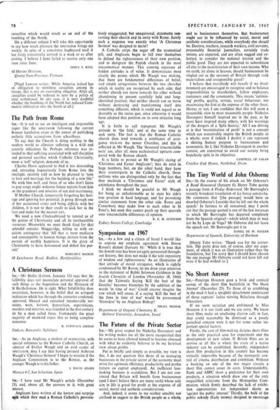The Future of the Private Sector SIR,—My great respect for
Nicholas Davenport and his writing makes me all the more exasperated that he seems to have allowed himself to become obsessed with what he evidently believes to be my heretical view about profits.
Put as briefly and simply as possible, my view is this. I do not question that those of us managing businesses in the private sector of the economy must strive for optimum efficiency, productivity and profits (return on capital employed). An inefficient loss- making business is scandalous. But I am not con- vinced that Britain will benefit from businessmen (and I don't believe there are many such) whose sole aim in life is greed for profit at the expense of all social, moral and aesthetic considerations.
And, indeed, it seems to me neither sensible nor civilised to suggest to the British people as a whole,
and to businessmen themselves, that businessmen ought not to be influenced by social, moral and aesthetic considerations, while everybody else should be. Doctors, teachers, research workers, civil servants, presumably financial journalists, certainly trade unions, are expected, and are often nagged and ex- horted, to consider the national interest and the public good. They are not expected to subordinate all else to the maximisation of their own income. Why on earth, let alone in heaven, should businessmen be singled out as the saviours of Britain through rank materialism and irresponsible greed?
I believe that everybody will benefit if we (busi- nessmen) are encouraged to recognise and to balance responsibilities to shareholders, fellow employees, customers and the community. This means 'optimis- ing' profits, quality, service, social behaviour; not maximising the first at the expense of the other three. Heresy or not, I am confident that this will seem a reasonable view to most reasonable people. Nicholas Davenport himself inspired me in the past, as he must have inspired many others, with his warnings of the dangers of a 'Split Society.' All I am driving at is that 'maximisation of profit' is not a concept which can conceivably inspire the British people as a whole; even if (which I doubt) it can represent a shining human purpose to businessmen and economists. So I, like Nicholas Davenport in another context, am concerned to avoid our society being hopelessly split in its objectives.


































 Previous page
Previous page